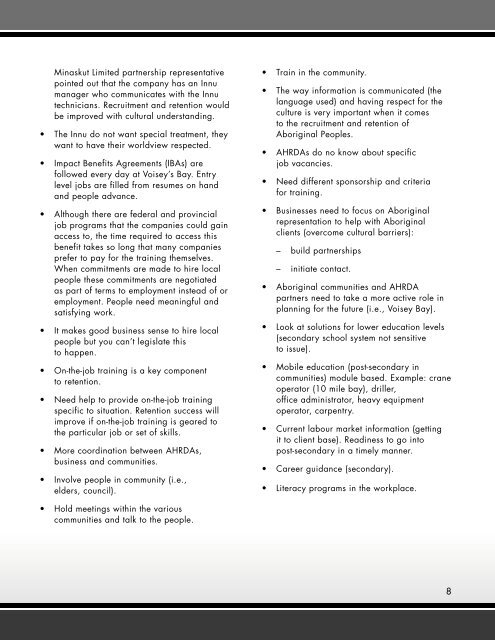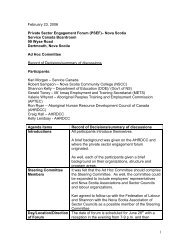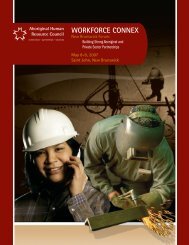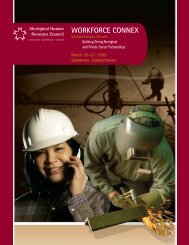Labrador - Aboriginal Human Resource Council
Labrador - Aboriginal Human Resource Council
Labrador - Aboriginal Human Resource Council
You also want an ePaper? Increase the reach of your titles
YUMPU automatically turns print PDFs into web optimized ePapers that Google loves.
Minaskut Limited partnership representative<br />
pointed out that the company has an Innu<br />
manager who communicates with the Innu<br />
technicians. Recruitment and retention would<br />
be improved with cultural understanding.<br />
• The Innu do not want special treatment, they<br />
want to have their worldview respected.<br />
• Impact Benefits Agreements (IBAs) are<br />
followed every day at Voisey’s Bay. Entry<br />
level jobs are filled from resumes on hand<br />
and people advance.<br />
• Although there are federal and provincial<br />
job programs that the companies could gain<br />
access to, the time required to access this<br />
benefit takes so long that many companies<br />
prefer to pay for the training themselves.<br />
When commitments are made to hire local<br />
people these commitments are negotiated<br />
as part of terms to employment instead of or<br />
employment. People need meaningful and<br />
satisfying work.<br />
• It makes good business sense to hire local<br />
people but you can’t legislate this<br />
to happen.<br />
• On-the-job training is a key component<br />
to retention.<br />
• Need help to provide on-the-job training<br />
specific to situation. Retention success will<br />
improve if on-the-job training is geared to<br />
the particular job or set of skills.<br />
• More coordination between AHRDAs,<br />
business and communities.<br />
• Involve people in community (i.e.,<br />
elders, council).<br />
• Train in the community.<br />
• The way information is communicated (the<br />
language used) and having respect for the<br />
culture is very important when it comes<br />
to the recruitment and retention of<br />
<strong>Aboriginal</strong> Peoples.<br />
• AHRDAs do no know about specific<br />
job vacancies.<br />
• Need different sponsorship and criteria<br />
for training.<br />
• Businesses need to focus on <strong>Aboriginal</strong><br />
representation to help with <strong>Aboriginal</strong><br />
clients (overcome cultural barriers):<br />
– build partnerships<br />
– initiate contact.<br />
• <strong>Aboriginal</strong> communities and AHRDA<br />
partners need to take a more active role in<br />
planning for the future (i.e., Voisey Bay).<br />
• Look at solutions for lower education levels<br />
(secondary school system not sensitive<br />
to issue).<br />
• Mobile education (post-secondary in<br />
communities) module based. Example: crane<br />
operator (10 mile bay), driller,<br />
office administrator, heavy equipment<br />
operator, carpentry.<br />
• Current labour market information (getting<br />
it to client base). Readiness to go into<br />
post-secondary in a timely manner.<br />
• Career guidance (secondary).<br />
• Literacy programs in the workplace.<br />
• Hold meetings within the various<br />
communities and talk to the people.<br />
8









